How to Start a Blog in 2021: Beginner’s Guide to $203k in a Year
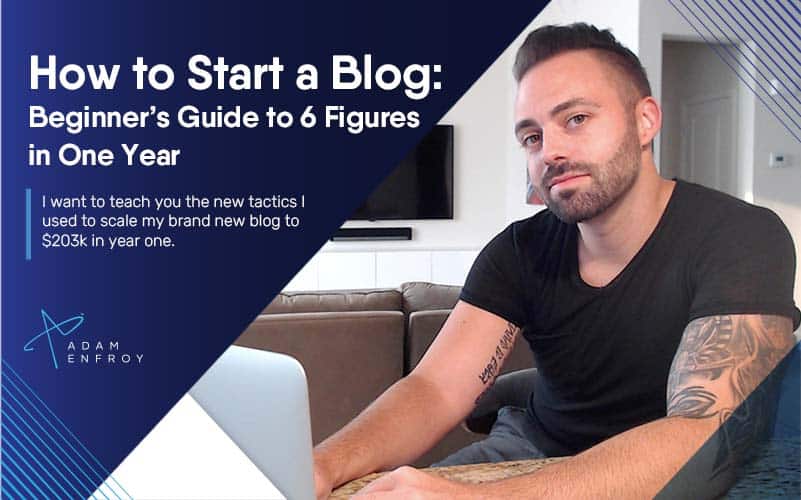
If you want to learn how to start a blog like a real business owner and not a hobbyist, you’ve come to the right place.
With millions of bloggers out there, a lot of people think that it’s too saturated to make money blogging in 2020.
I created this blog AdamEnfroy.com just last year (2019) as a case study to prove that you can start blogging right now and make significant money in months, not years.
You just need the right business tactics. And you need to scale.
So why should you follow my advice on how to start a blog?
- I launched this blog in January 2019, and today I make over $80,000/month.
- This blog got to 500k monthly visitors just 18 months after launch.
- The tactics I teach aren’t from old school bloggers but from startup content teams.
- I’ve failed a lot of times in the past and genuinely want you to succeed. So much blogging advice out there is outdated, and 95% of blogs are still failing – I want to change that.
This ultimate guide for beginners will cover how to choose the right niche, launch your site with WordPress, generate traffic, and monetize your site in the fastest timeframe possible – all while working full-time.
It is also very different from other articles you’ll find when you Google “how to start a blog.”
Most of those articles were written 5-10 years ago to appeal to a broad audience and get the most traffic.
This article provides content you won’t find anywhere else, including:
- Why you need to choose your own name as your domain name.
- Why you only need to write two types of blog posts to make money.
- Why you need to focus less on writing and more on link building.
- How you can build a massively profitable blog without writing at all.
- And much more.
Ultimately, I’m going to teach you the same tactics I used to grow my blog from zero and make enough money to quit my job in six months.
Disclaimer: Please note that this post includes affiliate links which may provide a commission to me at no cost to you. However, the links are for the best software and tools you need to start a successful blog. For more information, you can read my affiliate disclosure in my privacy policy.
How to Start a Blog in 11 Easy Steps.
1. Choose Your Blog’s Niche.
The first step to starting a blog is to get started with Bluehost. Use my link and get started for just $2.95/month (63% off your hosting plan).
We all know that your blog needs a niche – whether it’s marketing, cooking, Crossfit exercises, vegan dogsitting, underwater parkour solo dancing – whatever crazy blog topic, there are an endless amount of things to blog about.
Most professional bloggers will tell you to start with something that you’re passionate about because it helps you “maintain a consistent writing schedule and push through failure to succeed.”
They’ll also tell you to choose a niche at the intersection of passion, skills, and experience:
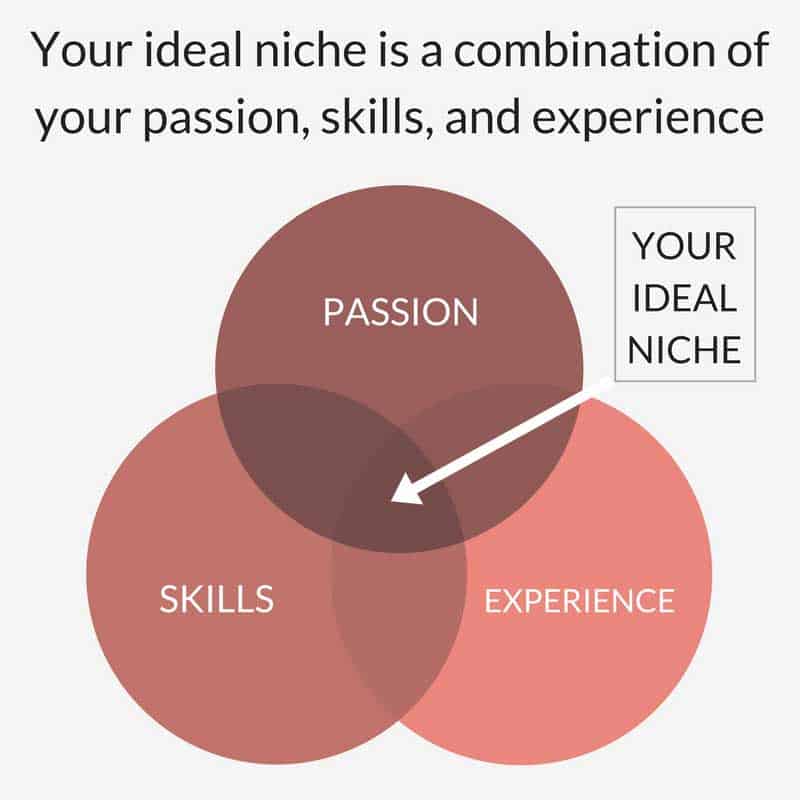
Source: mintnotion.com
However, this model is flawed because it’s missing one major component: monetization.
I firmly believe that with a blog, money drives passion more than passion drives money.
I could blog about my passions, skills, and experience for a while, but if I wasn’t gaining any readers or making any money, I’d quit 100% of the time.
And that’s why most blogs fail.
Bloggers don’t know how to transition from blogger to business owner.
Then they say their blog is “just a hobby” and give up on their dreams.
So we’re going to flip the script and learn how to start a blog like a business from day one.
To do that, we have to choose the perfect niche, right?
Not at first.
The odds of choosing the perfect niche when you are just starting as a beginner are infinitesimally small.
Here’s why you need to choose your own name as your domain name:
- You give yourself the freedom to pivot.
- You can test new content ideas and choose your niche over time.
- Bloggers make money selling information. People buy from people. People trust people. Authenticity sells.
- You build real influence on a platform that you own.
- Your blog becomes a digital resume, a launching off point, a website that builds professional experience and leverage.
Choose your name and move on.
Once you do this, we’ll choose your ideal niche not based on passions, but on four primary business factors:
- Audience Revenue Potential
- Affiliate Marketing Potential
- Professional Leverage
- Keyword Research
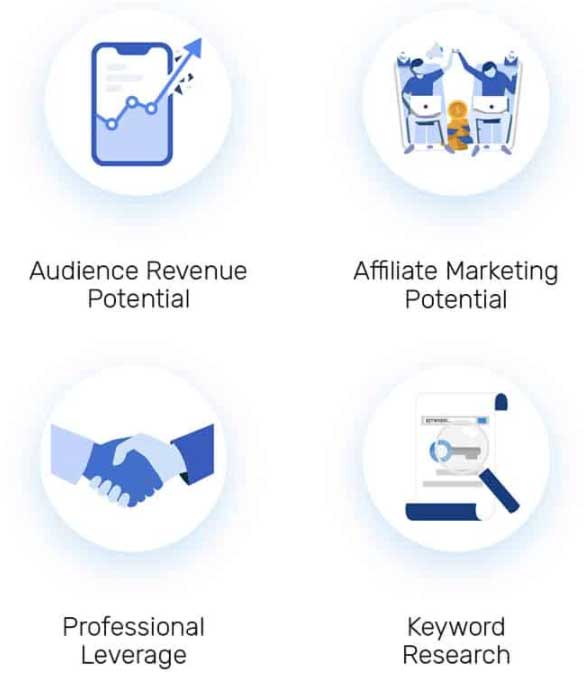
1. Audience Revenue Potential.
When you’re starting a new blog, the most common question is, “What should my niche be?”
The key is to find an area that you understand and solve a pain point for your audience.
However, you not only need to solve a pain point – you need to solve a pain point that an audience is willing to spend money on.
As a blogger, you need to understand your audience’s challenges deeply so that you can offer them exactly what they need.
And the best place to start is by looking at yourself.
Ask yourself, “What audiences am I a part of?”
You’re far more likely to understand a specific group’s struggles if you’ve encountered them yourself.
Take my blog, for example.
When I started this blog, I was a 31-year old American male working in the tech industry.
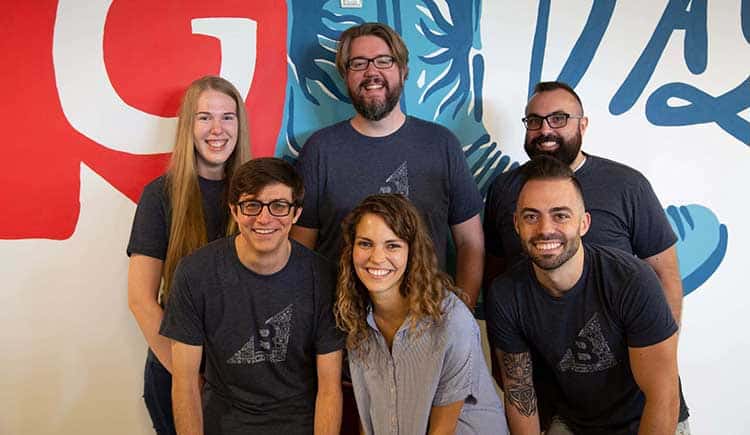
I was putting in long hours, sacrificing time with my family and friends, and getting stressed and burned out by the rat race.
So I created this blog as a means to an end – a way to make passive income, escape my 9-5 and take back control of my time – and my life.
So my target audience was people similar to me:
- 25-45 years old.
- Working 9-5 but want to escape the rat race.
- Ready to hustle and put in the work.
- Smart and technically savvy.
- People who want to make passive income through a blog.
Understanding your audience is the first step.
The second (and equally important) step is to understand how much your audience is willing to spend to solve their pain points.
This is your audience revenue potential.
This bears repeating: you need to understand your audience AND how much they’re willing to spend on your solution.
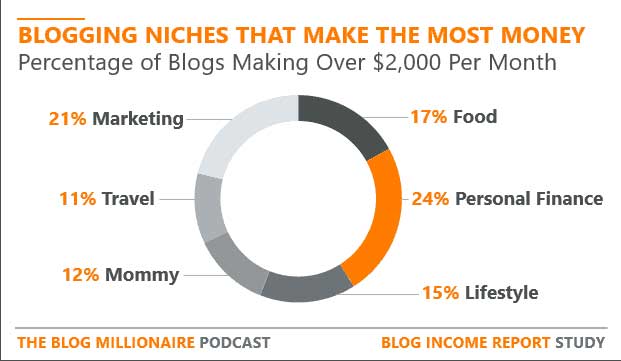
Source: successunscrambled.com
For example, let’s say you’re planning to start a blog about human resources and job tips for Millennials.
Your blog posts may pull in different types of readers, including job seekers, working professionals, and college students.
To monetize a blog in this niche, let’s say you create a sales funnel:
- You write new content to attract an audience online.
- Next, you build a “job interview checklist” lead magnet to generate email opt-ins.
- Third, you place affiliate links to some products you want to promote.
- Finally, you offer a $300 product titled “The Ultimate Job Interview Preparation Online Course.”
Nothing is wrong with this approach.
This tends to be a common approach for most new bloggers. If you were to put in a few years of content creation and building up your email list, I estimate you could start making a passive income in 2-3 years.
However, by slightly altering your potential niche, you drastically increase your blog’s income potential.
All you do is change your target audience from job seekers to job employers.
Let me explain.
By adding a B2B component to your blog, you shift your audience from individuals to businesses.
Businesses have larger bank accounts and are more likely to pay you without hesitation.
The beautiful thing about this approach is that your blog launch, content, and marketing funnel are pretty much the same. However, with the B2B component, you don’t just stop at a $300 course. You can add the final component of 5-figure online consulting.
Rather than writing a blog post on entry-level interview tips, position yourself as an expert and go after the businesses themselves by offering something like HR audits or onboarding consulting for thousands of dollars per month.
When you’re just starting out and traffic is hard to come by, offering consulting services is a great way to generate more income with less traffic.
It’s simple math: If your new blog has 100 visitors a 2% conversion rate, your two sales should be for thousands, not $19.99.
Instead of focusing on adding affiliate links and ads to your site when you have little traffic at the beginning, see if you can come up with a high-end consulting offer to build momentum and make money right out of the gate.
Remember, just understanding your audience’s pain points isn’t enough.
To improve your revenue potential, a portion of your audience needs to be in a lucrative business niche and pay on a monthly recurring basis.
With this approach, I hope you’re beginning to understand why I truly believe you can make $10,000/month in 90 days with a new blog.
These new funds will be used to accelerate your path to passive income, but we’ll leave it at that for now.
Let’s move onto something I’m very passionate about – affiliate marketing.
2. Your Niche Needs Affiliate Marketing Potential.
Affiliate marketing is my favorite form of blog monetization. It’s the most passive, and once you start getting traffic, you can make money while you sleep.
Affiliate marketing is the act of recommending products and services of other businesses and making a commission on every sale.
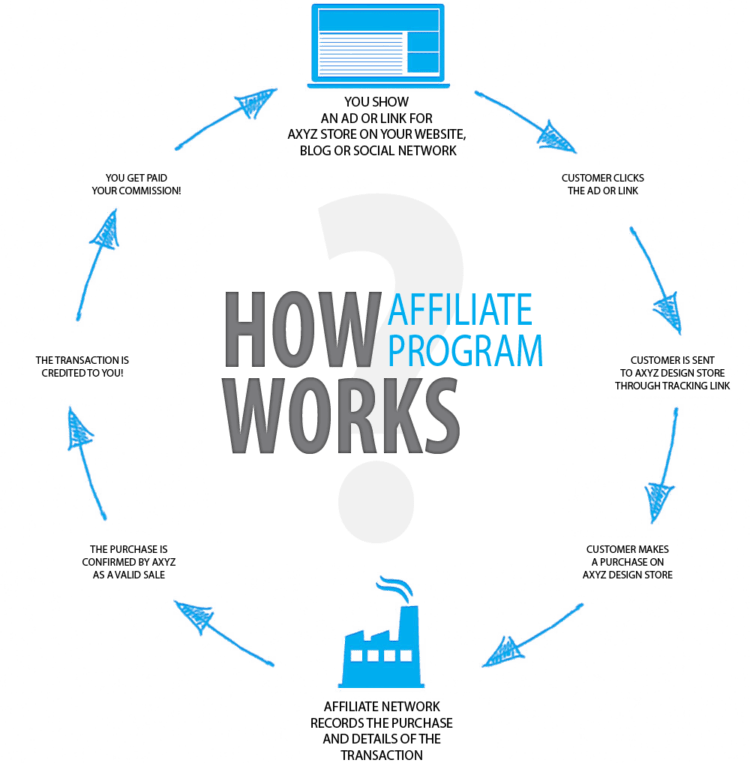
Source: affiliatemarketingtraining.com
Most large companies have affiliate programs you can join. Once you apply and are approved into their programs, you can grab your unique affiliate links to add to your blog, view reporting on clicks and sales, and see any future payouts you’re scheduled to receive.
Here are some steps to get started with affiliate marketing:
- Apply to a company’s affiliate program either on their site or in an affiliate network. For this, you’ll need a website and an email address from your domain – not just a Gmail or Yahoo email.
- Once approved, grab your unique affiliate link and copy/paste it into any piece of text on your blog.
When a user clicks that specific link, a cookie is stored in their computer, which credits the sale to you based on the cookie duration – typically 30, 60, or 90 days.
No comments: